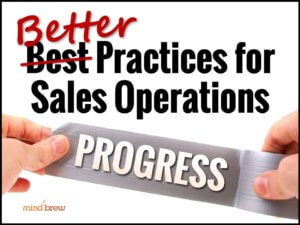When you’re running a sales operation, you often sit on the sidelines and watch the game play out. If you’ve done things right, you’ve equipped the team with what they need to win. But they’re the ones out on the field that need to run the plays and rack up the points.
Of course, after each game is over, you’re the one with the data to to analyze plays—see what went well and where improvements can be made. Unfortunately this is probably the most challenging hat to wear in Sales Ops.
Even the most affable sales reps can resent being told how to improve—especially when they’re being told how to improve deals they’ve already won. Maybe some analysis revealed that:
- Deals were discounted more than they should have been
- Logical cross- or up-sell products aren’t being sold
- Customers aren’t ordering the volume they could be
When these problems are discovered, it seems logical to sit the sales reps down and review ways to improve next time…talk about what could have been done differently and ensure it doesn’t happen again. But what are the odds of them being receptive to those problems? Not very high…
Thankfully there’s a trick. When you’ve been able to analyze the data to come up with the problem, you don’t have to stop there. The problems you’ve found are likely just symptoms. Use those analytic skills that helped uncover the solution to reveal the root causes. As much as we’d like to believe otherwise, most problems are caused by faulty systems and ineffective processes–not the reps themselves.
A popular diagnostic guide in The SellingBrew Playbook, Preventing Unprofitable Deals Before They Happen, does an excellent job of walking through the steps of diagnosing and understanding those root causes. But it also goes further with some helpful guidance on getting reps and the management team to actually take action when you discover what’s creating the problems in the first place.
So what’s the trick to get sales to accept constructive criticism? Don’t bother. Figure out the root cause and you can likely solve the problem without having to criticize the way those past deals were conducted. After all, your first job isn’t fixing the problem…it’s figuring out what the real problem is that needs fixing.












